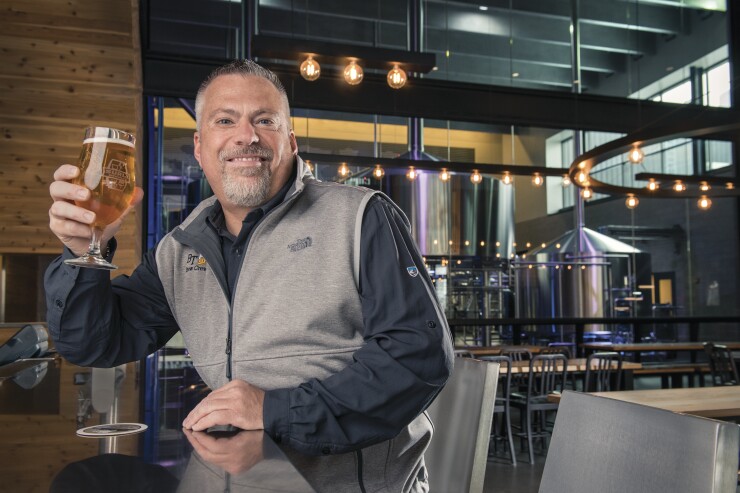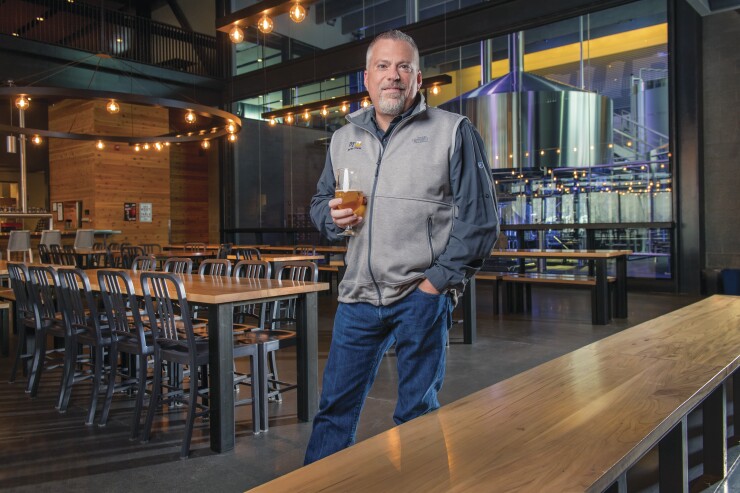The craft beer boom of the past several years has enticed a glut of entrepreneurs, industry veterans, and even hobbyists to rush into the hot market of ice-cold brews —though often without the business acumen to sustainably thrive in an exciting but complex industry.
That’s where Baker Tilly Virchow Krause, and the Top 15 firm’s craft beverage practice, step in to advise these businesses — ranging from regional start-ups to billion-dollar breweries. Of the roughly 150 clients Baker Tilly serves in its craft beverage practice (established as a dedicated part of the firm’s larger agribusiness, food and beverage channel in 2013), the smaller companies are the most obvious candidates for growth guidance.

Scott Ebert, partner and leader of the firm’s craft beverage practice, who has worked in the beer and beverage industry for more than 25 years, witnessed an industry shift around the turn of the Millennium.
“People started taking risks to open businesses because of the obvious opportunity,” he explained. “In the craft beer segment, really good beer was being made by artisans. There were a lot of them, but the vast majority didn’t have a business background. The marketplace allowed them to do fairly well, but there was an early identification that working with a distributor and a supplier, trying to grow the market share of each individual business would be an opportunity to assist them.”
The opportunities only multiplied as Ebert and his team, which is primarily based in Minnesota and Wisconsin, got close enough with these early-stage clients to identify new areas of need. Baker Tilly’s advisory services range from human resources to site selection, but generally fall into the categories of expansion services, sales channel management, technology, financial modeling and financing, and compliance and consulting. With so many possible points of service, Baker Tilly has naturally fostered a high-touch relationship with many of its craft beverage clientele. The firm’s focused practice enables it to solve these very specific problems, but with the resources and scope of a half-billion-dollar firm.
“A practice that just focuses on one industry allows for proactive instead of reactive,” Ebert shared, mentioning a waste water project the firm worked on with a large craft brewer as one example of recognizing and solving a problem — one that could be used as a scalable model for other breweries.
“In the vertical itself, that the craft industry lends itself to be repeatable in some areas is unique. Every manufacturer is different, but every brewery is not different,” he added.
While the work can be duplicated, the pain points differ from client to client.
“We act almost as an extension of their management, helping put together forecasted volume, working with distributors or with the back office on revenue and cash flow, in an integration of the business cycle where we provide the missing pieces. We can work with one beverage company that’s very strong on the sales side but very weak in finance and cash flow, or one that’s very strong in financing but does not know how to get the product to market.”
For example, Ebert shared, “a top 100 brewer in the country needed to expand its facility and wanted to do that by bringing in an equity partner. They started to talk to some advisors about how to go about that. They quickly learned that what they had in place, while the volume put them in the top 100, the back office, operations, technology, HR was not at a place to allow them to bring equity for what was foreseeable growth. The equity providers believed they couldn’t grow due to their structure, so they hired us and we helped them, in seven different areas, to get them up to speed.”

NOT STRAIGHT TO THE PINT
The craft beverage market, as with any explosively growing sector, has had its challenges and idiosyncrasies.
One recurring issue Ebert and his team advise clients on is navigating the three-tier system of alcohol distribution. Most states adhere to this structure, in which producers/suppliers can sell only to wholesale distributors, who then sell to retailers, who then sell to consumers. Some states, like Washington, permit fewer tiers, enabling producers to self-distribute. Others, like Pennsylvania and Utah, have a four-tier system where state governments have a monopoly on both the distribution and retail tiers.
There is “large lobbying” from distributors to keep the three-tier system, Ebert explained, though, of course, “the suppliers would love to get to two-tier and retain the margin.” For now, the Baker Tilly team acts as an essential guide through the inconsistent distribution structures.
Getting to that distribution phase, however, is not as easy as it once was. The sector has gotten so crowded and competitive that some industry analysts have compared it to the dot-com bubble of the late 1990s.
According to Ebert, though, talk of a bubble is overinflated: “There’s a little speculation out there, or opinion, that the craft beer industry is somewhat saturated. I don’t necessarily think it’s true.”
Still, he acknowledges, “the ability to move and grow that each individual supplier, manufacturer has done over the last few years is increasingly harder. For the local brewery with a good following in a 20-mile radius to increase to four states has gotten pretty tough, when three or even two years ago it might have been easy to do. There’s plenty of room for breweries in a 20-mile radius with a tap room, but for regional [breweries] trying to do it on a national level, it’s tough.”
Breweries of all sizes are competing for the same thing, which is evident in the fact that, according to Ebert, top 10 craft companies like Yuengling and New Belgium are still losing market share to local breweries.
“There’s only so much shelf space. Retailers measure profitability by shelf space. Everyone is fighting for the same shelf space,” he said.
Ebert is seeing that same territorial challenge heat up for his practice’s other beverage clients, which include the makers of energy and coffee drinks, specialty waters, wines and sodas. The lessons his team has learned from working in the burgeoning craft beer market can also be applied to the more recent surge in specialty snacks, like beef jerky and popcorn, as well as what Ebert deems the latest wave in craft beverages.
“The next level of boom is in craft distillers,” he shared. “Craft breweries that are seeing stagnation in cost to market can maybe open a distillery — do the same thing they did with the brewery so the barrier to entry goes down. They can broaden what they do as opposed to broadening geography.”
REACHING FOR TOP-SHELF TALENT
As these food and beverage segments have grown, so has the firm’s practice, with Ebert reporting 50 percent growth each year since Baker Tilly formally assembled its craft beverage team. Now, he is looking to expand that roster of roughly 25 professionals, many of whom were hired out of large breweries and distributors. The recent appointment of a veteran sales channel manager from Anheuser Busch represents the kind of industry experts Baker Tilly is seeking, regardless of geography, underscored by the recent hire of a market rep in Tennessee.
Baker Tilly’s top 25 craft beverage clients reside in 11 states, and while technology facilitates remote communication, travel is a big part of working with such high-touch clients. Even with the ability to hire remotely, finding qualified talent is tough. “It’s absolutely challenging, as the demand for services is outpacing how [quickly] we can bring on talented resources from the industry,” Ebert said.
New team members can be assured they have the backing of firm leadership, which Ebert cites as integral to the practice’s success. “One of the things that has allowed us, in the last two, two and a half years to see extreme growth, is that instead of making it someone else’s second job, they’ve made a conscious effort to free up, completely, internal resources, including myself. [Baker Tilly leadership said], ‘Stop what you’re doing, there’s too much opportunity, focus 100 percent of your time and effort on the beverage sector channel.’ [Baker Tilly] has tried to do that before in different areas of the firm, but while doing other stuff, and keeping clients, creating a normal result. When you really focus on it, and learn the industry, and all service lines are invested, it really snowballs. Especially with all the marketing support the firm has given us.”
That includes active membership in brewer and distributor associations.
“The culture and drive of the partnership of the firm allows you the resources and strength of the firm to achieve growth. The alignment and support has been absolutely critical,” he added.
AT A GLANCE
Firm: Baker Tilly Virchow Krause
Headquarters: Chicago
Chairman and CEO: Alan Whitman
No. of partners/staff: 154/2,309
Year founded: 1931
Craft beverage practice leader: Scott Ebert
Practice-specific services: Expansion; financial modeling & financing; compliance & consulting; distribution rights; sales channel; technology





